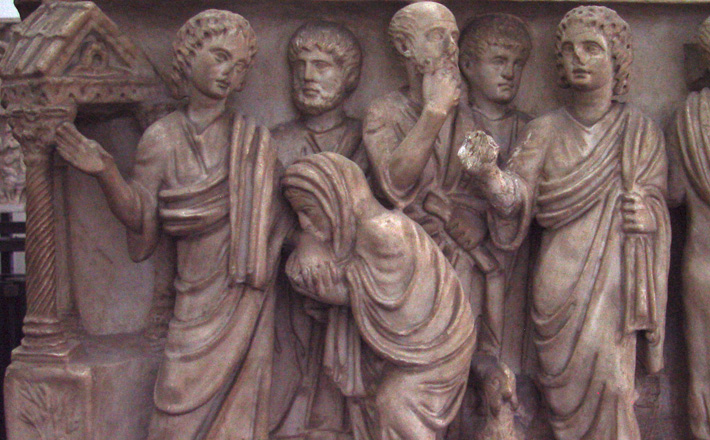Commentary on Jeremiah 1:4-10
Most prophetic books provide little or no information about the life of the prophet.
In contrast, stories about the life of Jeremiah comprise one of the signature features of the book that bears his name. Narratives of imprisonment, commitment to God’s command not to marry or have children, persecution, false accusations of treason, forced exile to Egypt, destruction of a manuscript by King Jehoiakim, and an unfruitful search for just one righteous person (for whom God would relent concerning a planned destruction) add an unprecedented personal touch to his prophecies. Whether they possess historical authenticity or merely serve as literary devices, these accounts make the book of Jeremiah as exhilarating as it is inspirational.
The story of Jeremiah’s call to preach, which appears immediately after the superscription, is the first of many stories about his life. This is a job that Jeremiah neither seeks nor welcomes. Citing his young age, he objects. God, however, will not let Jeremiah’s youth stand in the way of sending a message that the people of Israel need to hear, even if they do not want to hear it. Jeremiah would not be alone for God regularly seeks young people for divine work. Jacob, Joseph, Miriam, Gideon, Joshua, Samuel, David, Daniel, Shadrack, Meshack, Abednego, Mary, Jarius’ daughter, Timothy, and Jesus at age twelve were all young when they too encountered the divine. Reluctantly, Jeremiah says yes to God’s call.
Jeremiah’s home, Anathoth, is located just three miles north of Jerusalem. He is a member of a priestly family that was displaced years earlier by Solomon. Walter Brueggemann explains the significance of Jeremiah’s family background:
The importance … is that this family of priests … had long been opposed to the ostentatious self-indulgence of the Davidic house in its trajectory of economic-military autonomy on which Solomon had set it. This means that Jeremiah was a product and representative of a theology grounded in hostility to the Davidic establishment that is both very old and very deep[1]
With this backdrop, it seems likely that Jeremiah’s call to ministry was a call to make public what he already felt in his heart.
Living during a time of national transition meant that Jeremiah’s critique is both urgent and necessary. He preached during the reigns of five kings, from reform under Josiah through exile under Zedekiah. Louis Stulman summarizes his ministry noting that Jeremiah “will pronounce the death of one world and the birth of another . . . [as he engages] the dangerous work of dismantling Judah’s civic, cultural, and religious life.”[2] Jeremiah’s critique will leave none unscathed. Messages of destruction uttered against not only Jerusalem and Judah, but also against Egypt, Gaza (the Philistines), Moab, Ammon, Edom, Syria (Damascus), and Babylon make it clear that God is the God of all nations, whether they know it or not.
As the book unfolds, it is apparent that Jeremiah is called to deliver a message that is both difficult and unwelcome. The declaration that God knew him before he was born, even before he was formed in his mother’s womb, does not exempt Jeremiah from problems inherent in his ministerial call. Neither the command not to be afraid, nor the promise of God’s presence, is enough to shield Jeremiah from the trouble that awaits him. Anticipating the difficulty may have been part of the reason why Jeremiah objected to God’s summons.
Four (pluck up, pull down, destroy, overthrow) of the six verbs God uses to describe Jeremiah’s appointment have negative connotations. Only two verbs (build, plant) have positive connotations. The use of twice as many negative verbs as positive ones affirms that Jeremiah’s message will largely focus on destruction and devastation.
The complexity of his message is reflected in the ambivalence of his love-hate relationship with his assigned task. Though compelled to preach, Jeremiah seems to retain the reluctance of his youth throughout his ministerial career. For example, later in Jeremiah 20:9, Jeremiah complains that preaching is “like a burning fire shut up in my bones.” Not only does Jeremiah protest that he has become a “laughingstock” and an object of mockery, he accuses God of enticing and overpowering him (20:7). Like Job, he laments the day of his birth.
The duality of his response might cause one to wonder whether he is bi-polar, suffers schizophrenia, or is just having a bad day. Perhaps it is none of these, for his words reflect the kind of “grappling [that] may lead to deeper faith.”[3] By the end of the book it is obvious that despite his misgivings about his call, Jeremiah’s “faith was big enough and bold enough to embrace the whole tragic sense of human history and to see that God had been fully involved in it.”[4] His faith was big enough for the difficult complex task to which God called him.
[1] Walter Brueggemann, The Theology of the Book of Jeremiah (New York: Cambridge University Press, 2007), 30.
[2] Louis Stulman, Jeremiah (Nashville: Abingdon, 2005), 42.
[3] Paul L. Redditt, Introduction to the Prophets (Grand Rapids: William B. Eerdmans Publishing Company, 2008), 122.
[4] R. E. Clements, Jeremiah (Atlanta: John Knox Press, 1988), 14.


August 25, 2013